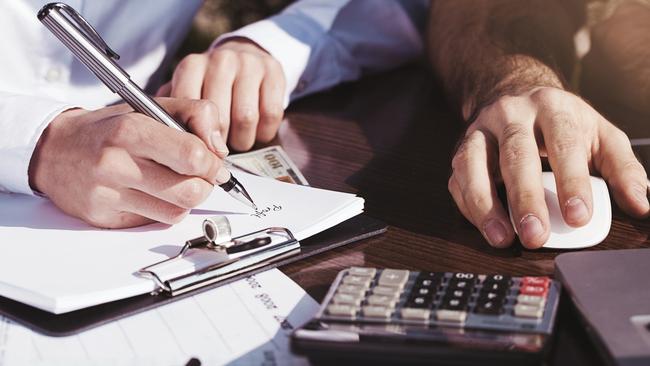Australians are leaving themselves short of emergency savings in the bank
ONE in five Australians believe having $1000 in emergency savings is enough, but experts reveal how much you really need tucked away.
Business
Don't miss out on the headlines from Business. Followed categories will be added to My News.
EXCLUSIVE
ONE in five Australians believe having $1000 in emergency savings is enough but experts say people need much more than this.
Many households are battling soaring cost of living expenses and record levels of debt, but new findings from Westpac show 46 per cent have just $5000 or less tucked away in case disaster strikes.
Last week the Reserve Bank of Australia raised concerns about household debt increasing by far more than household incomes in the past three decades.
THE BEST WAYS TO INVEST YOUR TAX RETURN
SHOULD YOU GROCERY SHOP WEEKLY OR DAILY?
The Westpac data, which quizzed 2000 Australians, found 20 per cent believe $1000 or less is enough for emergency savings, while 14 per cent believe up to $5000 is enough.
Rising Tide Financial Services’ managing director Chris Browne said the exact amount you need tucked away “comes down to your own personal anxiety levels.”

“A minimum you want at least one months’ worth of salary and a maximum of three months’ of salary,’’ he said.
“Savings should always sit in a high-interest account with no fees or your mortgage offset account (day-to-day transaction account).”
He said for those prone to dipping into their savings it should be put somewhere that it cannot easily be spent.
This includes a term deposit or an account not linked to your daily transaction account.
Depending on what an emergency is, for many people this is when there’s a loss of job, ill health or unforeseen expenses such as car repairs.

Westpac’s head of savings Kathryn Carpenter said the research found three in 10 people dipped into their emergency savings for bills ahead of payday highlighting pressure on living expenses.
“More than half said they had dipped into savings for a fun/impulsive purchase — this was particularly the case when on holiday for example,’’ she said.
“Unplanned impulsive spending is likely to put pressure on other areas of your finances, so it’s important to have a budget that plans for no surprises and a balanced approach to spending.”
As to where people are parking their savings the research found 41 per cent use a regular savings accounts while 35 per cent split their savings account multiple accounts.
Others tuck their cash in their mortgage offset account or a term deposit.
Many savings accounts are delivering dismal interest rates with returns as low as one or two per cent.
The research showed the most successful savings strategies people adopted included putting money in a hard to access bank account (32 per cent), eating cheaply for the week (30 per cent) and restricting access from their bank account (28 per cent).
RELATED CONTENT
HOW TO SCORE YOURSELF CHEAPER ELECTRICITY BILLS
EXPERTS GUIDE TO GETTING THE BEST MOBILE DATA PLANS
5 TIPS FOR SAVING ON YOUR MOBILE DATA PLAN
HOW SWITCHING ENERGY RETAILERS CAN SAVE YOU INSTANTLY
Originally published as Australians are leaving themselves short of emergency savings in the bank


